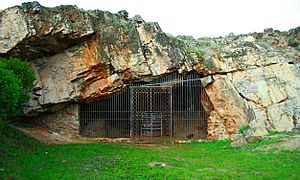Cave of Maltravieso facts for kids
The Cave of Maltravieso is a very old cave located in Cáceres, Extremadura, Spain. It was discovered in 1951. This special cave shows signs that people lived there a long, long time ago, during a period called the Middle Paleolithic. It's famous for its amazing cave art, especially the many hand stencils found on its walls.
Discovering Ancient Art
The Cave of Maltravieso holds incredible cave art. Scientists have found 71 hand stencils inside. These are like outlines of hands painted on the cave walls. In the 1990s, experts used special ultraviolet photography to count and study them all. Besides the hand stencils, there are also simple line drawings and some paintings of animals.
Who Made the Art?
One of the most exciting discoveries happened in 2018. Scientists used a method called uranium-thorium dating to find out how old a hand stencil from the cave was. They found it was about 64,000 years old! This is a very important date because it means the art was made before modern humans arrived in Europe. This suggests that Neanderthals, who lived in Europe at that time, might have been the artists. This idea has changed how we think about Neanderthal behavior and their abilities.
Visiting the Cave
Even though the original cave is protected, you can learn all about it! A special visitor center, called the Centro de interpretación de la Cueva de Maltravieso, opened in 1999. Here, you can explore exhibits and learn about the cave's history, its art, and the ancient people who lived there.
Other Nearby Caves
The Cave of Maltravieso isn't the only ancient site in the area. There are other nearby caves from the Paleolithic period, like El Conejar, Santa Ana, and Castañar de Ibor. These caves also offer clues about early human life in Spain.
See also
 In Spanish: Cueva de Maltravieso para niños
In Spanish: Cueva de Maltravieso para niños


